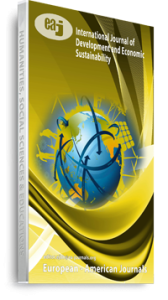The broad aim of this study is to investigate how government expenditures affect economic development in Nigeria. The study was anchored on the Keynesian theory and adopted the ex post facto research design. Data for the study was collected from secondary sources such as the Central Bank of Nigeria statistical bulletin and World Bank Development Indicators for the period 2000 to 2024. Findings of the study offers evidence of significant positive impact of government expenditure on education, expenditure on health, and expenditure on agriculture on economic development. Overall, the empirical result showed that government expenditures have a significant positive relationship with economic development in Nigeria and recommended that government should increase budgetary allocation for education and health to at least 15% to 25% of the total budget.
Keywords: Economic Development, Government Expenditure, Per Capita Income, expenditure on agriculture, expenditure on education, expenditure on health

